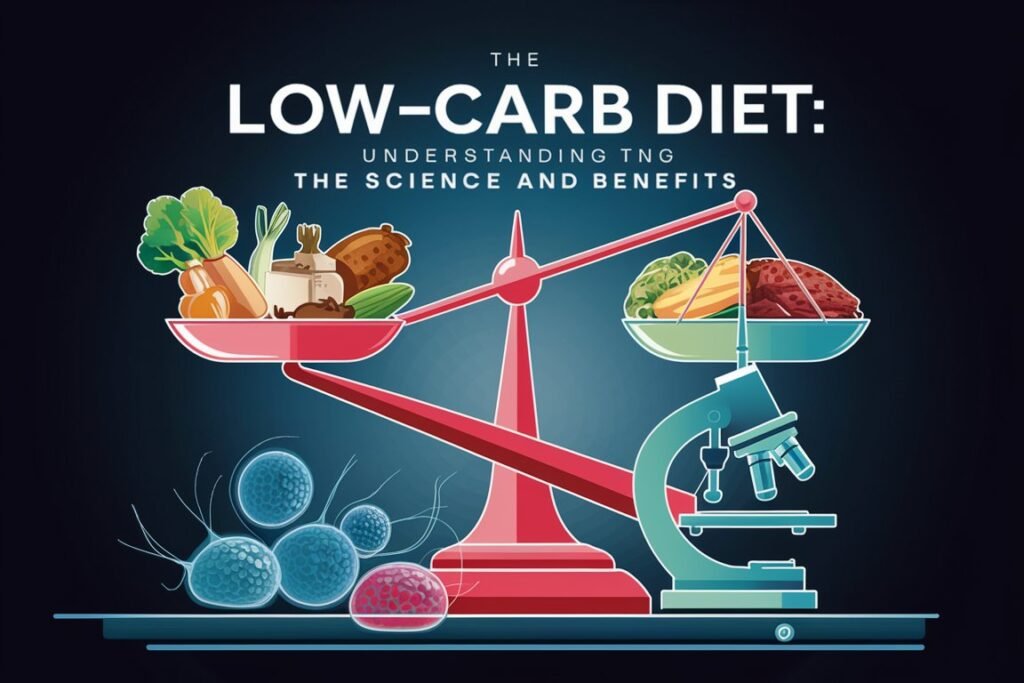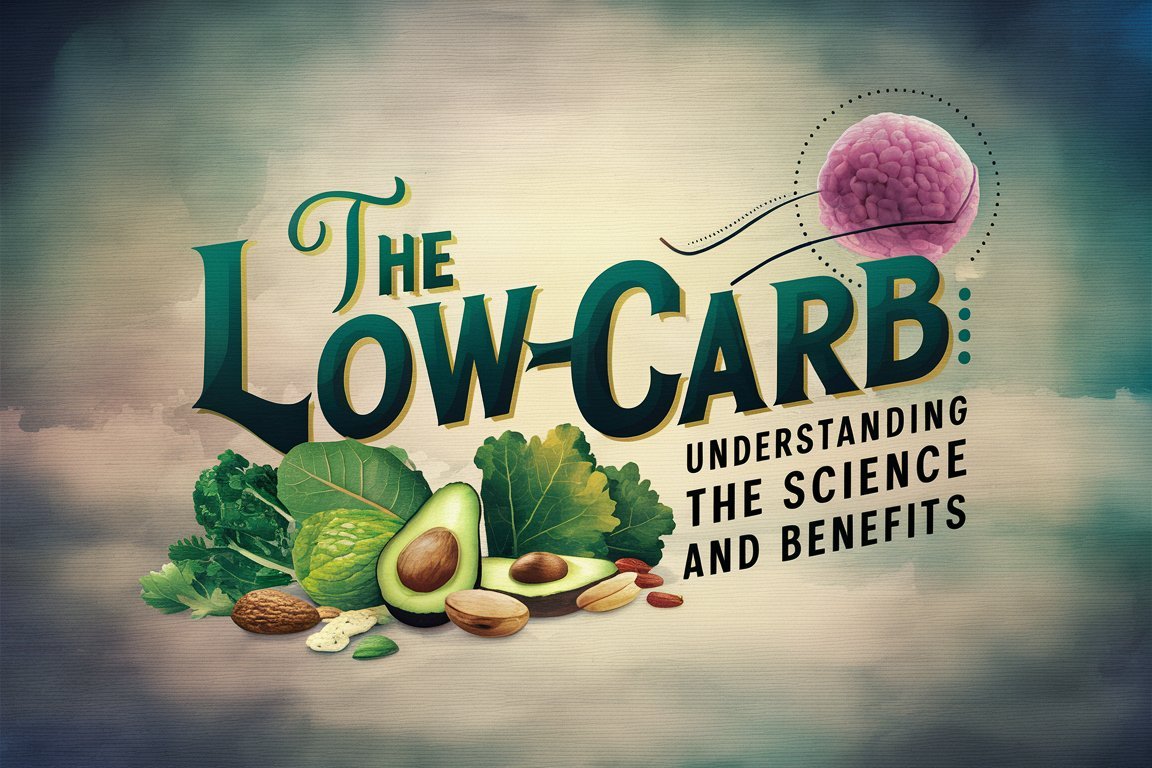Create the image of this title “The Low-Carb Diet: Understanding the Science and Benefits
Hey there, my young and curious friends of 2024! It’s your favorite nutrition explorer, Nita Sharda, here to take you on an exciting journey into the world of low-carb diets. Now, I know what you might be thinking – “Low-carb diets? Isn’t that just a fancy way of saying no more yummy bread and pasta?” But trust me, there’s so much more to low-carb diets than just cutting out carbs!
Today, we’re going to put on our explorer hats and discover the science behind low-carb diets, and how they can benefit our health and wellbeing. But before we dive in, let me make one thing clear – this is not about putting anyone on a strict diet or making them feel bad about what they eat. It’s simply about empowering you with the knowledge and tools to make informed choices about your nutrition, now and in the future.

So, are you ready to join me on this low-carb adventure? Let’s go!
What are Carbohydrates?
First things first, let’s talk about what carbohydrates actually are. Carbohydrates are one of the three main macronutrients (along with protein and fat) that our bodies need for energy and proper functioning. They’re found in a wide variety of foods, including:
- Grains like bread, pasta, rice, and cereal
- Starchy vegetables like potatoes, corn, and peas
- Fruits like apples, bananas, and oranges
- Dairy products like milk and yogurt
- Sugary foods like candy, soda, and baked goods
When we eat carbohydrates, our bodies break them down into glucose (a type of sugar) which is then used for energy. Any excess glucose that’s not immediately needed gets stored in our liver and muscles as glycogen, or converted to fat for long-term storage.
The Rise of Low-Carb Diets
For many years, the standard advice for a healthy diet was to eat plenty of carbohydrates, especially from whole grains and fruits. But in recent years, low-carb diets have gained popularity as a way to lose weight and improve certain health markers.
The idea behind low-carb diets is simple: by limiting your intake of carbohydrates, you force your body to burn fat for fuel instead of relying on glucose from carbs. This can lead to rapid weight loss, especially in the beginning, as your body depletes its glycogen stores and sheds excess water weight.
There are many different types of low-carb diets, ranging from very strict (like the ketogenic diet, which limits carbs to less than 50 grams per day) to more moderate approaches (like the South Beach diet, which allows for some whole grains and fruits). But in general, low-carb diets aim to keep carbohydrate intake below 45% of total daily calories.
The Science Behind Low-Carb Diets
So, what does the science say about low-carb diets? Are they really as effective as some people claim? Let’s take a closer look.
Weight Loss
One of the main reasons people try low-carb diets is for weight loss. And there’s good evidence to suggest that they can be effective in this regard. A 2018 review of 32 studies found that low-carb diets led to significantly greater weight loss than low-fat diets, especially in the short term (6 months or less).
One reason low-carb diets may be effective for weight loss is that they tend to be higher in protein and fat, which can help keep you feeling full and satisfied for longer. They may also lead to a spontaneous reduction in calorie intake, as people tend to eat less when they’re not constantly hungry.
Blood Sugar Control
Another potential benefit of low-carb diets is improved blood sugar control, especially for people with type 2 diabetes or insulin resistance. When you eat a high-carb meal, your blood sugar levels rise quickly as the carbs are broken down into glucose. This triggers your pancreas to release insulin, a hormone that helps shuttle the glucose into your cells for energy.
But if you’re insulin resistant, your cells don’t respond as well to insulin, which can lead to high blood sugar levels over time. By limiting your carb intake, low-carb diets can help keep your blood sugar levels more stable and reduce your risk of developing diabetes or other metabolic disorders.
Heart Health
Some studies suggest that low-carb diets may also have benefits for heart health. A 2019 review found that low-carb diets led to greater improvements in several cardiovascular risk factors, including:
- Triglycerides (a type of fat in the blood)
- HDL (“good”) cholesterol
- Blood pressure
- Waist circumference
However, it’s important to note that not all low-carb diets are created equal. Some versions, like the Atkins diet, may be high in saturated fat and low in fiber, which could potentially increase your risk of heart disease over time. It’s important to choose healthy sources of protein and fat, like lean meats, fish, nuts, and seeds, and to include plenty of non-starchy vegetables for fiber and nutrients.
Potential Drawbacks of Low-Carb Diets
While low-carb diets can have some impressive benefits, they’re not for everyone. Here are a few potential drawbacks to keep in mind:
Nutrient Deficiencies
Cutting out entire food groups like grains and fruits can make it harder to get all the nutrients your body needs. Low-carb diets may be low in certain vitamins and minerals, like vitamin C, magnesium, and potassium, as well as fiber. It’s important to choose nutrient-dense foods and consider taking a multivitamin supplement if needed.
Digestive Issues
Some people may experience digestive discomfort when they first start a low-carb diet, especially if they’re not used to eating a lot of fat and protein. This can include symptoms like constipation, diarrhea, and bloating. Drinking plenty of water and including non-starchy vegetables can help keep things moving smoothly.
Sustainability
Let’s face it – cutting out bread, pasta, and other beloved carbs can be tough! Some people may find low-carb diets difficult to stick with long-term, especially if they feel deprived or restricted. It’s important to find a way of eating that feels sustainable and enjoyable for you, even if that means including some healthy carbs in moderation.
How to Follow a Healthy Low-Carb Diet
If you’re interested in trying a low-carb diet, here are some tips to help you do it in a healthy and sustainable way:
- Focus on whole, minimally processed foods like meat, fish, eggs, non-starchy vegetables, nuts, and seeds.
- Include healthy sources of fat like avocado, olive oil, and fatty fish to keep you feeling full and satisfied.
- Don’t be afraid of protein! Aim for at least 0.7-1 gram of protein per pound of body weight to help preserve muscle mass and keep you feeling full.
- Stay hydrated by drinking plenty of water and other low-carb beverages like tea and coffee.
- Consider taking a multivitamin supplement to fill in any potential nutrient gaps.
- Listen to your body and adjust your carb intake as needed. Some people may feel better on a very low-carb diet, while others may do better with a more moderate approach.
The Bottom Line
Wow, we covered a lot of ground today! But I hope this gives you a better understanding of what low-carb diets are, how they work, and some of their potential benefits and drawbacks.
Remember, there’s no one-size-fits-all approach to nutrition. What works for one person may not work for another, and that’s okay! The key is to find a way of eating that makes you feel your best – physically, mentally, and emotionally.
If you’re curious about trying a low-carb diet, talk to your doctor or a registered dietitian first to make sure it’s safe and appropriate for you. And most importantly, focus on nourishing your body with whole, minimally processed foods, staying active, and enjoying the journey!
Thanks for joining me on this low-carb adventure, my young and amazing friends. Until next time, keep exploring, keep learning, and keep fueling your body and mind with the good stuff. And if you ever have any questions, you know where to find me – I’m always here to help!













Leave a Reply